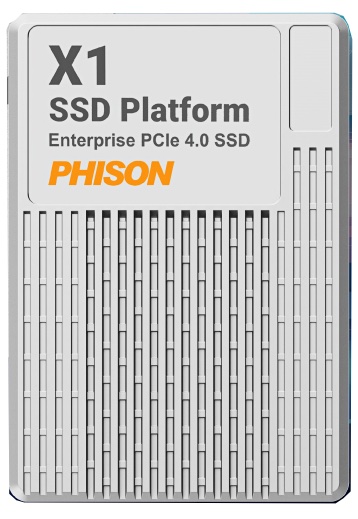A combined Phison-Seagate X1 SSD effort is reporting some impressive numbers that would make it the highest-performing standard 4-lane PCIe 4 we have encountered.
HDD manufacturer and Nytro SSD supplier Seagate did the drive design and testing with Phison, which also provided the controller and built the SSD.
The unit boasts a processor complex with two performance and power-efficient ARM R5 CPUs and dozens of small CPU co-processors that complete computationally heavy, redundant tasks at high speed with, Phison says, a minimum of power consumption.

Phison CTO Sebastien Jean claimed the X1 is the world’s best-in-class enterprise SSD and said it was “created to bolster the industry’s enterprise-class product offerings for a variety of applications such as AI, Cloud Storage, and 5G edge computing.”
High-performance computing is another target market.
The X1 comes in 1 drive write per day (DWPD) read-intensive and 3DWPD mixed-use formats with the latter having lower capacity due to the necessary over-provisioning. The read-intensive version has 1.92TB, 3.84TB, 7.68TB, and 15.36TB capacity levels with the mixed-use version having 1.6TB, 3.2TB, 6.4TB, and 12.8TB capacities.
It has a U.3 format, backwards-compatible with U.2, and the power consumption rating is 13.5W for random reads, 17.9W for random writes and 6.5W when idle. Phison claims it offers more than a 30 percent increase in data reads than existing market competitors for the same power used.
The X1’s quoted performance stats show the fastest random read IOPS and sequential read bandwidth of any 4-lane PCIe gen 4 SSD we have come across:
- Random read IOPS: 1,750,000
- Random write IOPs: 470,000
- Sequential read bandwidth: 7.4GB/sec
- Sequential write bandwidth: 7.2GB/sec
- Latency: 84μs read, 10μs write
This is faster than Kioxia’s CD8 PCIe gen 5 SSD, with twice the speed of PCIe 4’s bus speed. The CD8 is an unusually slow PCIe 5 SSD. Other PCIe gen 5 SSDs from Fadu (Echo) and Samsung (PM1743) are much faster and outperfrom the X1.
Liqid’s PCIe 4 LQD4500 “Honey Badger” drive is faster than the X1, but it has 16 x PCIe 4 lanes, 4 x more than the X1, and is a different class of product.
The X1 drive has power loss protection capacitors (pFail), end-to-end data path protection, SMBus, multistreams, SR-IOV, TCG Opal 2.0 support, along with sanitize and crypto erase features.
Phison, which says it has a more than 20 percent share of the SSD controller market, will customize the X1 for specific customers such as channel partners. Get more information here.








